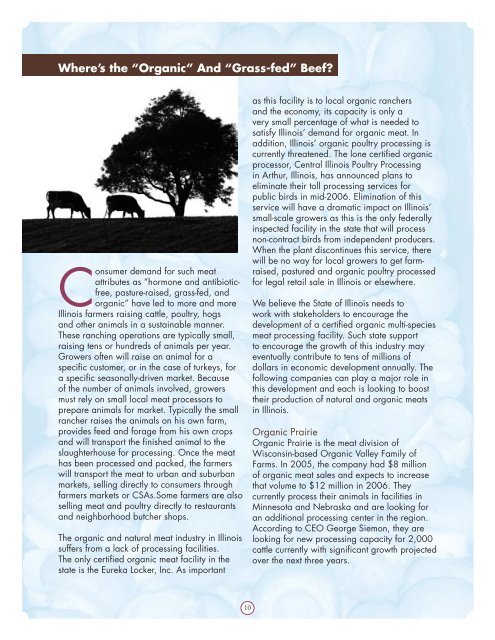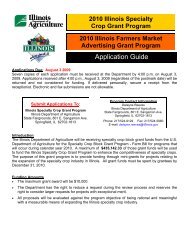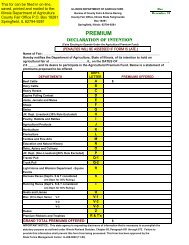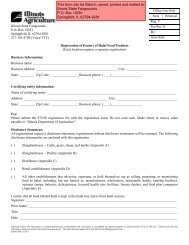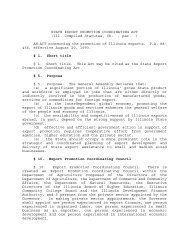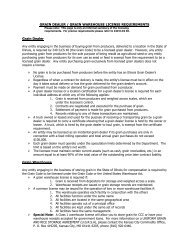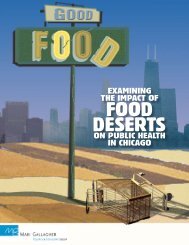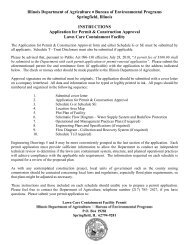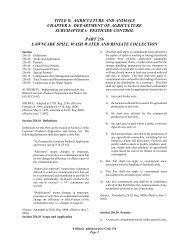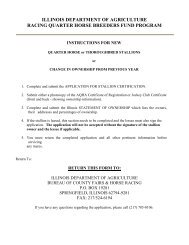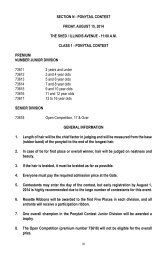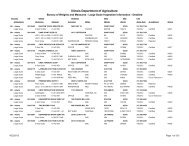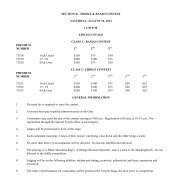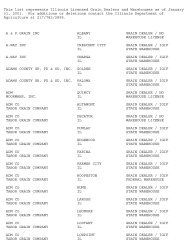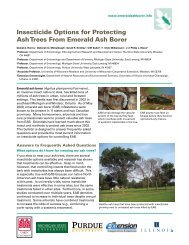Organic Harvest Report - Illinois Department of Agriculture
Organic Harvest Report - Illinois Department of Agriculture
Organic Harvest Report - Illinois Department of Agriculture
You also want an ePaper? Increase the reach of your titles
YUMPU automatically turns print PDFs into web optimized ePapers that Google loves.
Where’s the “<strong>Organic</strong>” And “Grass-fed” Beef<br />
Consumer demand for such meat<br />
attributes as “hormone and antibioticfree,<br />
pasture-raised, grass-fed, and<br />
organic” have led to more and more<br />
<strong>Illinois</strong> farmers raising cattle, poultry, hogs<br />
and other animals in a sustainable manner.<br />
These ranching operations are typically small,<br />
raising tens or hundreds <strong>of</strong> animals per year.<br />
Growers <strong>of</strong>ten will raise an animal for a<br />
specific customer, or in the case <strong>of</strong> turkeys, for<br />
a specific seasonally-driven market. Because<br />
<strong>of</strong> the number <strong>of</strong> animals involved, growers<br />
must rely on small local meat processors to<br />
prepare animals for market. Typically the small<br />
rancher raises the animals on his own farm,<br />
provides feed and forage from his own crops<br />
and will transport the finished animal to the<br />
slaughterhouse for processing. Once the meat<br />
has been processed and packed, the farmers<br />
will transport the meat to urban and suburban<br />
markets, selling directly to consumers through<br />
farmers markets or CSAs.Some farmers are also<br />
selling meat and poultry directly to restaurants<br />
and neighborhood butcher shops.<br />
The organic and natural meat industry in <strong>Illinois</strong><br />
suffers from a lack <strong>of</strong> processing facilities.<br />
The only certified organic meat facility in the<br />
state is the Eureka Locker, Inc. As important<br />
as this facility is to local organic ranchers<br />
and the economy, its capacity is only a<br />
very small percentage <strong>of</strong> what is needed to<br />
satisfy <strong>Illinois</strong>’ demand for organic meat. In<br />
addition, <strong>Illinois</strong>’ organic poultry processing is<br />
currently threatened. The lone certified organic<br />
processor, Central <strong>Illinois</strong> Poultry Processing<br />
in Arthur, <strong>Illinois</strong>, has announced plans to<br />
eliminate their toll processing services for<br />
public birds in mid-2006. Elimination <strong>of</strong> this<br />
service will have a dramatic impact on <strong>Illinois</strong>’<br />
small-scale growers as this is the only federally<br />
inspected facility in the state that will process<br />
non-contract birds from independent producers.<br />
When the plant discontinues this service, there<br />
will be no way for local growers to get farmraised,<br />
pastured and organic poultry processed<br />
for legal retail sale in <strong>Illinois</strong> or elsewhere.<br />
We believe the State <strong>of</strong> <strong>Illinois</strong> needs to<br />
work with stakeholders to encourage the<br />
development <strong>of</strong> a certified organic multi-species<br />
meat processing facility. Such state support<br />
to encourage the growth <strong>of</strong> this industry may<br />
eventually contribute to tens <strong>of</strong> millions <strong>of</strong><br />
dollars in economic development annually. The<br />
following companies can play a major role in<br />
this development and each is looking to boost<br />
their production <strong>of</strong> natural and organic meats<br />
in <strong>Illinois</strong>.<br />
<strong>Organic</strong> Prairie<br />
<strong>Organic</strong> Prairie is the meat division <strong>of</strong><br />
Wisconsin-based <strong>Organic</strong> Valley Family <strong>of</strong><br />
Farms. In 2005, the company had $8 million<br />
<strong>of</strong> organic meat sales and expects to increase<br />
that volume to $12 million in 2006. They<br />
currently process their animals in facilities in<br />
Minnesota and Nebraska and are looking for<br />
an additional processing center in the region.<br />
According to CEO George Siemon, they are<br />
looking for new processing capacity for 2,000<br />
cattle currently with significant growth projected<br />
over the next three years.<br />
10


